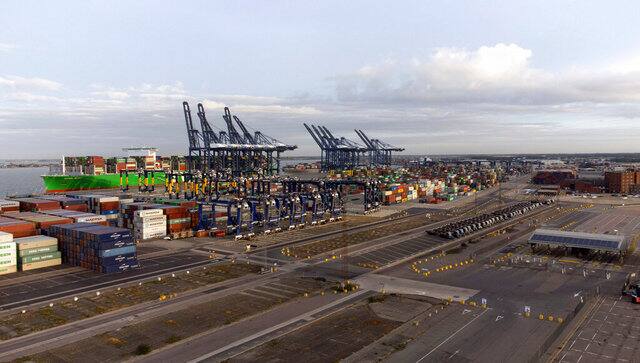Almost 2,000 UK dock workers including crane drivers and machine operators walked off their jobs at Britain’s biggest container port on Sunday in the country’s latest industrial dispute. The Port of Felixstowe, located around 150 kilometers northeast of London, handles around four million containers a year from 2,000 ships – almost half of the country’s incoming shipping freight. The action over pay has raised fears of severe supply chain problems even as Britain battles soaring food and energy price hikes and reels from a series of walkouts by transportation workers that have disrupted economic activity across the country. Let’s take a closer look: Why is this happening? The workers want more money to meet increasing costs. Latest figures put inflation at 10.1 per cent — a 40-year-high — and increasing numbers of Britons are struggling to cope with steeply rising energy and food bills as wages fail to catch up with the cost of living. As per The Guardian, workers voted in favour of strikes by more than 9 to 1. As per Al-Jazeera, the Bank of England has forecast inflation to l top 13 per cent this year, tipping the British economy into a lengthy recession. A growing number of unions are planning strikes as Britain faces its worst cost-of-living crisis in decades. Postal workers, lawyers, British Telecom staff and garbage collectors have all announced walkouts for later this month. Rail workers began a series of large-scale strikes that grounded national train travel in June, demanding better pay and working conditions as authorities try to reform the rail system, which has lost large chunks of its income due to the coronavirus pandemic and shifting commuting patterns. [caption id=“attachment_11097471” align=“alignnone” width=“640”]  Aerial view of the Port of Felixstowe in Suffolk. AP[/caption] The government and transit unions have not reached a resolution despite months of talks. What do both sides say? As per Sky News, the union Unite said that employer Felixstowe Dock and Railway Company had failed to improve on its offer of a 7 per cent pay increase after offering only a 1.4 per cent hike last year.
As per BBC, Unite called the offer “significantly below” the rate of inflation.
Sharon Graham, general secretary of Unite, the labuor union that called for the strike, alleged the company that operates the “enormously profitable” dock and its parent company, C.K Hutchison Holding Ltd, prioritized shareholder profits over worker welfare. “They can give Felixstowe workers a decent pay raise. It’s clear both companies have prioritised delivering multimillion-pound profits and dividends rather than paying their workers a decent wage,” she said. A spokesperson at Felixstowe port told BBC: “The port has not had a strike since 1989 and we are disappointed that the union has served notice of industrial action while talks are ongoing. The port provides secure and well-paid employment and there will be no winners from industrial action.” The port claimed workers involved in the dispute earned an average of £43,000 a year. The Port of Felixstowe said in a statement that it regretted the impact the strikes would have on UK supply chains. It said workers were offered a pay raise “worth over 8 per cent on average in the current year.” Unite national officer for docks Bobby Morton told Sky News: “Strike action will cause huge disruption and will generate massive shockwaves throughout the UK’s supply chain, but this dispute is entirely of the company’s own making. “It has had every opportunity to make our members a fair offer, but has chosen not to do so. Felixstowe needs to stop prevaricating and make a pay offer which meets our members’ expectations.” More talks are slated for Monday, as per Sky News. What could be the impact?
The strike could mean vessels have to be diverted to ports elsewhere in the UK or Europe.
As per The Guardian, haulage firms have warned of a ‘serious impact’ on business, while trade organisations have said consumers could face price rises. Adam Searle, managing director of CP Transport, said his firm could lose £60,000-£70,000 if it does not move any containers this week. “Throughout Suffolk the bill could run into the millions and throughout the country a lot more,” he told the BBC. “It’s not going to affect food supply chains, because all the fresh produce is already in stock, but it will affect the supply chain in terms of furniture, fences and random bits and bobs.” As per Al-Jazeera, shipping group Maersk has warned of operational delays and forcing changes to its vessel line-up. “This is a massively important port, especially in terms of textiles, but also all sorts of products brought in through here,” Al Jazeera’s Harry Fawcett said. “So there are businesses and there are consumers around the UK already struggling. And action like this, of course, is going to make those supply chains still more vulnerable and could be a factor in increased inflation going forwards.” With inputs from agencies


)
)
)
)
)
)
)
)
)



